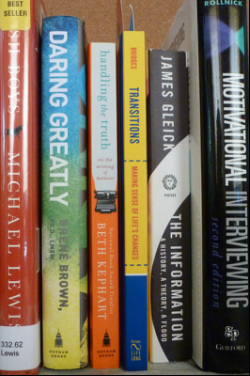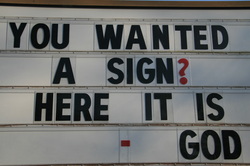What I'm Writing |
 This is part of an occasional series on practices, which might be helpful for your spiritual path. One of the keys to living a simpler life is finding the right balance in how you spend your time. Here’s the simplest priority setting process I know, which I have adapted from Richard Foster’s Freedom of Simplicity. Three Marker Test
Foster recommends you ask a few questions before you cut. 1. What do I want? (Sometimes, asking, why do I want that?) 2. What am I longing for? 3. How is God inviting me to say yes to this season of my life? I’d add a couple more. a. What would you do if you really had the freedom to follow your dreams? b. If you’re a bit older, how might your younger self have imagined you today? Each time I stop and consider my time and the way it is used, I find out something new about myself and who I am becoming. I often use those same big pieces of paper to create timelines, looking backwards at the year that was. It always helps me focus. Obviously, I’ve just suggested you take your schedule and make some radical changes. Many of us, probably have things in our schedule, which we don’t want to do, but still need to do. The point of the little exercise is less to end up with a perfect schedule and more to move towards discovering what matters to you and prioritizing that. Finally a quote from Foster: “If your season of life has changed; you might experiment with radical change.” What might radical change look like for you?
0 Comments
 I’ve recently done some purging of books, including many of the wonderful – tongue in cheek – books I had the joy of purchasing and reading in seminary. Many of these books, and their authors, meant well, but they no longer describe the post-post-modern, Great Recession, ever changing world as I see it out my window. Because, let’s face it, most of the books you read, aren’t cutting it in today’s church. And, who needs more grow the church books? I need books with real ideas, which actually work. 1. Transitions Because, every church/pastor/denomination is going through one right now. And, having a story, or way to understand all that movement, really, really helps. This is both an administration book and a pastoral care book. 2. Daring Greatly Brown’s book is not theology, but it is the best practical theology book I have ever read. Her understanding of shame, which I read as sin, is second to none. Do yourself a favor and see what theology can be, when it is informed by social science and not dogma. 3. The Information: a history, a theory, a flood or Flash Boys: A Wall Street Revolt These two books are tied, in my mind, because they are both describing the same sorts of phenomena: big data, big money, and the need to make some sense of it all. Big data could easily become a stand in for God; our faith needs an answer. Glieck’s book is like Saint Thomas Aquinas. Flash Boys is more Martin Luther. 4. Motivational Interviewing Here is the best tool for fostering and fermenting change in established congregations. Once you get past the talk about alcohol and drugs, you find a deep understanding of how to help people change. Should be required reading for all denominational officials. 5. Handling the Truth Here is your preaching text. Sermons from on high no longer work. Meaning, we must take our stand in the midst of our own broken and battered lives. That’s handling the truth. Kephart’s book is like a workshop and seminar all rolled into one. There you have it: vision, pastoral care, ethics, theology, and preaching. I believe these are some of the ideas that a local church revival will be built upon. What would you add? 6/12/2014 1 Comment Google trends/Ministerial Realities Nothing puts more perspective on all the time spent on sermons, like looking at a Thursday afternoon collection of trends on Google/Trends. (http://tinyurl.com/kjnwka) Don’t believe me? Go check for yourself. Compare, something like, “sermon” or “prayer” or “church,” with someone like Justin Bieber. “Sermon” doesn’t come out so good; although for good or ill “church” does seem to have a longer forecast than a certain singer. (If you haven’t played around with this data yourself; I would encourage you to. Particularly, if you’re interested in finding that heavenly note of relevancy, which is often elusive in many sermons, I’ve heard over the years.) My point: back in my parish church days I spent hours writing sermons that, it seems, the world is not really looking to hear. If Google is a representation of our great cultural imagination, then sermons are not going to carry the day. However, I do suspect that hidden in this ocean of data, is also something very profound about what it means to be human. Humanity is incredibly complex, and, increasingly we have the data to show that complexity. Preaching into this new world takes guts, but also it takes fresh eyes to see what is happening in the world today. Google has offered us preachers a way to see the world, the whole global world, with new eyes. Here’s my take away: I believe strongly that learning to read and understand information like this, is essential for having and finding meaningful things to say to this brave new world. People drown in data and they need people of faith and calling to help them learn to swim. So, dear reader, how has this data changed your view? What new insights have you gained?  There’s a TED talk about the teddy bear, which argues that Teddy Roosevelt’s famous friend changed the way we understand the natural world. (Check it out here: http://tinyurl.com/nq5rur8.) Teddy, the prez, changed a scary bear into something cute. I buy it, because I think it makes sense. Now, apply that thinking to church. Local churches need something like the Teddy Bear to survive. In the background, another bit of marketing , this from the town of Leominster, Mass. Leominster is a central Massachusetts town, which I’ve driven through a couple times. I briefly lived in neighboring Gardner, which has lately fallen on some hard economic times. Back in 1939, some film makers came to Leominster and shot a short video, which was sort of an early recruitment video for the then thriving industrial town. For our purposes, this little video, showed many “houses of worship” and all the people that were flocking to them. Tucked into the back of some of those shots: the iconic church sign complete with white letters, worship times, and witty topic. Not obviously this sign, a little risqué for 1939, but still very much recognizable. Now, I ask you, dear reader, what else has stayed largely the same since that video was shot? Not the factories. Those have mostly closed. Not the stores. Big boxes, hyper abundance, and internet shopping still had a ways to go. Not even the people. Families, neighborhoods, and nations are all changing. I’d take the TED talk speaker’s argument one step forward and say that the local church as a cultural institution is now heading towards extinction, at least in my little corner of the Northeast United States. Now, the Church, big C, will survive this little cultural moment as it has for the past 2,000 years, by adapting, shifting locations, and finding the Jesus people where they are. I’m talking about the local church, the neighborhood outpost of the established church in America, those might be fast fading away. I say: we need a symbol to help save this institution. Any thoughts on what that might be? I’d love to hear your thoughts in the comments below. 3/13/2014 0 Comments Elevator SpeechI wonder if you have ever heard the expression, “elevator speech.” The notion is you might find yourself with only an elevator ride, 30 seconds or so, to sell your idea, or project or even get your foot in the door to a new job.
Career service workers often encourage those looking to find a new job to think about how they might best pull one of these little pitches off. People are encouraged to note their skills, or their abilities, or to highlight their vision. As some of you know, I recently took a night class at the local community college, which deals with nonprofit management. Our class was asked to offer up our best elevator pitch for our respective organizations. I’m not the best at this sort of thing, but this morning we will meet a couple characters in our readings that really must have had it down. We’ll first meet Jacob who convinced his whole family to head out into the desert. We’ll then meet a widow who against all odds finds justice at the hands of an unjust judge. So, in the moments before we begin, I’d ask you to consider your own elevator speech, the one you might offer if asked to speak about your faith. I wonder would words come easily or would it be difficult? What words would you use to speak about, ask for, or defend the impulse that brought you here at this time? Say a little prayer of gratitude for whatever comes. 1/6/2014 1 Comment Finding the LightEpiphany relates to a Greek word which means “to cause to appear” or “to bring to light.”
Traditionally we remember this season by remarking on three events: the visit from the wise men from the east, the baptism by John in the Jordan River and Christ turning water into wine at the wedding feast. It may seem strange to mark time in the way that we do here, but if you let it the Church calendar can become a tool of transformation. It can help to focus your prayer life, your devotional considerations, and to help shape the way you make meaning in the world. Epiphany is the season when things that were hidden come into view and change more clearly into the glory of God. This can be a challenge in our current society, which tends to prefer sound bites and surface meanings to intentional exploration and deep thinking. So, while you are waiting, cast your mind over your life and pause when you find something that you need a little more clarity about, a little more hope in, a little more light shining upon. Perhaps, that little nudge in your subconscious is God directing your first steps into this new season and New Year. 12/8/2013 0 Comments Power This is the second week of Advent, a season of waiting and wanting. This special time lasts only four weeks, ending the week of Christmas Eve and Christmas.
Advent simply means “the coming.” This morning we will be thinking about the next marker of that new world by focusing on the idea of peace. Peace might simply mean the absence of war, but our faith calls for more than that. Peace in the Christian tradition implies not just a ceasing of hostilities, but also a building of relationship and connection that surpasses all understanding. It’s a big challenge and one that can only be met through the work and life of Jesus the Christ, who we call the King of Kings. A central message of the Advent season is this expected new relationship, which helps to heal all the people of the world and, indeed, all of creation. Do you find this a powerful challenge? I know I do, especially, in our current environment, which seems to delight in finding reasons for difference and separation instead of reconciliation and relationship. While you are waiting, I would invite you to consider what sort of leader would be needed to bring such a change into this world? What sort of power would they have? What tools would they use? This week: pray for the leaders in your life. 12/3/2013 0 Comments Sneaky Hope This is the first week of Advent, a season of waiting and wanting, which begins our church year. Advent lasts only four weeks, ending the week of Christmas and Christmas Eve.
Before that, we will hear beginning this morning, a story both very familiar and very odd. This story begins during a time long ago, so long ago some would say the Earth was not yet formed and a first light had yet to dawn. Others would place the beginning of this story to a time when a group of slaves rebelled and took to wandering the deserts seeking the Promised Land. Still others might trace the beginnings of this story to the hope that those people heard in the ways of an active God, a God that took special care of God’s people. For us, perhaps, the story that we begin again this year, started in our own life with some of the magic of the Christmas season. Perhaps, it began long ago, when you learned some of the words to hymns and carols you now know by hear. Perhaps, it began, when you learned that Christmas was a special time, because something special happens. Or just perhaps, you are still waiting for that Christmas to really come into your life. Still waiting for the promises that you hoped God would bring: the blessings, the new life, the rebirth of old life. Pick a starting point this morning. Pick a place to stand And, then, be prepared to begin the walk home again. 11/24/2013 0 Comments Hunger Games: Part 2 On Friday, the second installment of the Hunger Games opened in theaters. The movie is the second of a series of books, which are aimed at teenage readers and have all three been best-sellers.
The Hunger Games is a way for a post-apocalyptic society ruled by elites to keep the native populace under control. The Games are televised spectacle that pits children against each other in arena, think The Voice only with children and spears. The winner of the game must vanquish not only rivals from other regions, but one of their own neighbors. This second installment is less about the games and more about how a society begins to fight back and to rebel and to ferment into revolution. They call this episode: “Catching Fire.” Now, what does this have to do with Sunday morning? Perhaps not much, but as always when something seems to capture the American imagination it makes sense for people of faith to wonder a little about it. This morning we will consider what God is looking for from each of us. Or, said, another way, what sorts of things, choices, gifts, make God smile? Advent and Christmas are nearly upon us, but before we get to that we have this season of Thanksgiving. We’ll dream into that space this morning. 11/17/2013 0 Comments Finding Comfort This morning we are going to continue our exploration of the great biblical prophets, this time focusing on the works of Isaiah. Isaiah’s work comes to us as a single book, but scholars tell us this collection of poems, stories, rants, and rambles is more likely the result of a school of writers working over a span of time.
We typically turn to Isaiah during the period of Advent, that period of waiting and wanting that comes before Christmas time. However, Christmas is already in our collective shopping malls, big box stores, and on our radio stations. Much of this is marketing and commerce, but this year, it seems to me, folks are yearning for the hope of Christmas in a way that feels different somehow. Perhaps, it’s the attendant stresses of a poor economy, the chill that settled upon the valley, but it seems like the soul of the nation is really waiting for hope to be born again. Folks who know me, know, that I tend to be a lover of light and turn part bear, as the days grow shorter, to plagiarize a bit of Donald Hall, a favorite poet of mine. Isaiah was a prophet, who stood between God and the people during a similar time of challenge and anticipation. Big things were happening in the life of the people of God and not all of them were good. It is perhaps all the more remarkable that it is from this ground that we have some of very tender descriptions of God’s love. God is seen not just as a father, but as a mother comforting a wounded and challenged people. This morning: we will celebrate that sense of being loved and comforted by God. |
Archives
June 2020
CategoriesAll Big Blue Notebook Blogging Church History Data Driven Emergent In Church This Morning Internet Marketing Simple Living Simplicity Spiritual Discipline |
 RSS Feed
RSS Feed
